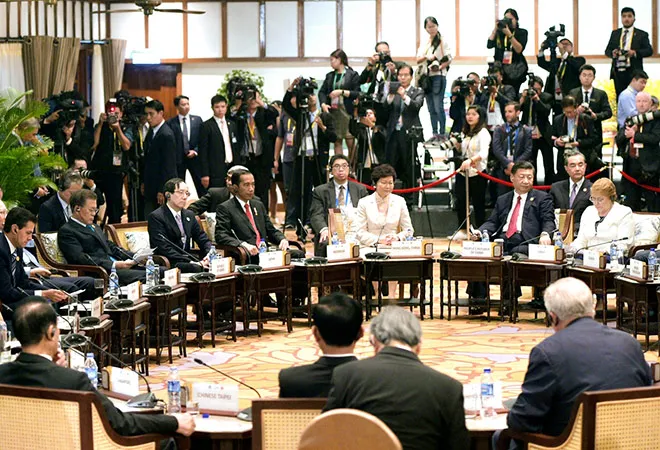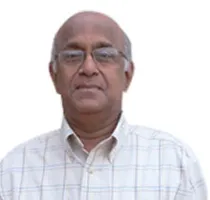
Relations between the three East Asian countries — China, Japan and South Korea — continue to be fluid despite the optimism raised by the leaders of the three countries at the time of the APEC meeting held at Da Nang (November 2017) and the East Asian Summit meeting in Manila that immediately followed. It was hoped that the three would soon resume their annual trilateral meeting which had last met in November 2015.
Given the strong economic and political interests that bind China and South Korea, it was also believed the two countries would quickly move to place their relations on a strong footing. But Seoul’s earlier decision to deploy the US THAAD (Terminal High Altitude Area Defence) had strained its relations with Beijing. Though Seoul made it clear that the deployment of THAAD was intended to counter the missile threats coming from North Korea, China had its own scepticism. Suspecting that the THAAD could also be used to spy on its military operations in northeast China, Beijing reacted rather sharply by taking measures to curb South Korean investments in China. Korean business houses like the Lotte suffered a great deal due to China’s action. Beijing also suspended group tours to Korea which used to bring many financial benefits to Seoul. Beijing even put a ban on the visits of Korean cultural troupes to China.
In a bid to assuage China’s security concerns, and to restore normal relations, South Korea announced in October that it would adopt a “three no’s policy” — no additional THAAD deployment, no participation in the US’s missile defence network and no establishment of a trilateral alliance with the US and Japan.
When Chinese President Xi Jinping met his South Korean counterpart Moon Jae-in on the sidelines of the APEC meeting at Da Nang, he stated that both countries should respect each other’s core interests and major concerns, create political trust and enhance communication and coordination. Commenting on the THAAD issue, he stressed that both countries should adopt an attitude that took into serious consideration their bilateral ties and the interests of the two peoples. Any decisions they took should stand the test of history so as to move forward in bilateral relations in the right direction, he emphasised. It was agreed that both leaders would address all moot points in the bilateral ties at the time of President Moon’s upcoming summit meeting with Xi in Beijing.
In a bid to assuage China’s security concerns, and to restore normal relations, South Korea announced in October that it would adopt a “three no’s policy.”
In pursuance of this, South Korean Foreign Minister Kang Kyung-wha made an official visit to Beijing on 25 November to lay the groundwork for Moon’s visit in December. Kang met with Chinese Foreign Minister Wang Yi and had a wide-ranging discussion on both the current challenges posed by North Korea, and the Sino-ROK ties.
President Moon made his first official visit to China from 14 December and it provided him with an opportunity to meet all important Chinese leaders. It is significant that both Moon and Xi at their summit meeting reached an agreement on the following four principles for peace and security on the peninsula:
- There is no military solution to the current North Korean issue,
- Both China and South Korea will maintain firmly their commitment to Peninsula’s denuclearisation,
- They will strive for peaceful resolution of the North Korean issue through dialogue and negotiations, and
- Improvement in the inter-Korean relations would contribute to peace on the Peninsula.
On bilateral ties, China seems to have somewhat softened its position on the THAAD issue and evinced more interest on the future directions of the bilateral engagements. But one should not ignore certain bilateral irritations stemming from US-ROK security alliance. For instance, South Korean participation in the combat air drills with the US and Japan has aroused the resentment of China. Similarly, Moon does not share many aspects of US President Donald Trump’s strategy towards North Korea. How Seoul is going to balance its relations with the US and China particularly when their interests and strategies do not converge is the biggest diplomatic dilemma that Moon faces now. Moon can ill-afford to even think of weakening Seoul’s military alliance with the US which has guaranteed its security for decades. At the same time, cordial relations with China are also very crucial for South Korea’s economy as China is the biggest trading partner and also a major destination for ROK’s investment. Further China also holds the key for a solution to the challenges posed by North Korea’s nuclear and missile threats.
On bilateral ties, China seems to have somewhat softened its position on the THAAD issue and evinced more interest on the future directions of the bilateral engagements.
Seoul’s relations with Japan also continue to be clouded by historical issues even though Japan claimed that it had “finally and irreversibly” settled the controversial comfort women issue by signing an agreement in December 2015. By this agreement Japan agreed to provide one billion yen (USD 9 million) to a foundation devoted to supporting the sex slavery victims during the Second World War.
But during the Presidential campaign in April-May 2017, the agreement was heatedly debated and Moon himself questioned its validity. After assuming the Presidential office, Moon tried to separate the historical issues from the normal diplomatic relations with Japan. He also met with Japanese Prime Minister Shinzo Abe on the sidelines of some important global forums and both showed their interest in strengthening their relations. They also had a trilateral meeting with US President Trump in September which was aimed at bolstering the trilateral cooperation against North Korea. Trump’s visit to Japan and South Korea in November sought to further consolidate the e trilateral cooperation.
As an ally of the US, Moon understands that robust cooperation with Japan will enhance their “deterrence and response capabilities” against Pyongyang. Further, he also believes that cordial relations with Japan could improve its bargaining strength with China. Further, it could also give stronger assurance to Seoul in a highly uncertain security environment.
Unfortunately, when the Seoul-Tokyo relations seemed to look upbeat, the report of a Task Force appointed earlier by Moon to review the 2015 agreement has just come out with damaging observations questioning the whole procedure in reaching the accord. It points out that the negotiations for the 2015 agreement were conducted ‘secretly’. Another complaint is that the views of the victims were not adequately reflected in the agreement. Strongly countering these complaints, the Japanese government asserts that any attempt to reopen the negotiations will be totally unacceptable.
The report has in a way opened the Pandora’s Box again and since both governments have taken strong positions on the issue, one cannot rule out the possibility of one more spell of deadlock in the bilateral relations. In turn, how it will affect the prospects of holding the China-Japan-South Korea trilateral in the coming months is anybody’s guess.
The views expressed above belong to the author(s). ORF research and analyses now available on Telegram! Click here to access our curated content — blogs, longforms and interviews.




 PREV
PREV


